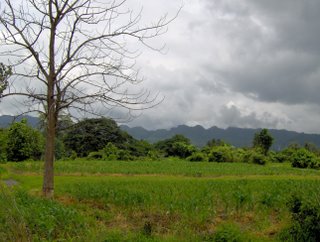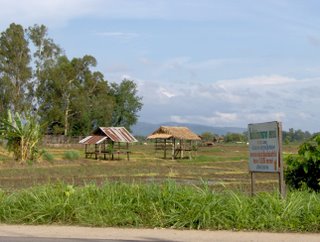Early Teaching Impressions

My internship finally began this week. I think I can go ahead and - with little fear from "the authorities" - say that I am teaching English. (There are so many people teaching English here that I don't think the Thai police could really nab everyone, even if they were so inclined, which they are probably not.) I'm teaching twice a day: once to students who are about my age, and once to staff of the NGO that shall remain nameless. Theoretically, at least, I'm also helping conduct research for the NGO; three hours of teaching per day, though, leaves me spending most of my time (so far, at least) preparing for class.
The students who are more or less my age - in the 18-25 range - live about 20 minutes outside of Mae Sot by pick-up truck. The classroom itself is actually quite nice, and the students are well-enough supplied in terms of paper, pens, etc. They are all from Burma, but their ethnicities vary widely: Mon, Shan, Karen, Kayen, Karenni, Chin, Kachin, Arakan, etc. - all of these states are represented in my class. Many of these students, a strong majority of whom are female, grew up in refugee camps or on the run as IDP's in Eastern Burma. One student was born in a refugee camp. None of them live in the camps now, though.
Their English skills are really quite impressive. On the first day of class, we discussed international politics, the place of the United States in the world ("big economic power," they said; "occupiers of Iraq"), some key words from an article I brought (marginalized, impoverished, rampant, indigenous, multilateral - none of these words were any trouble for them), and, of course, football. Ronaldhino's their favorite player. On the second day of class (the third is yet to come), I played some Neil Young for them and they all began singing along without any prompting. "Good to See You": we were working on how to introduce people to one another. I also showed a clip from Butch Cassidy and the Sundance Kid, but they had a little more trouble following that. The one line they seemed to enjoy was when Butch says to Woodcock, "Would you shut up about that E.H. Harriman and open that door?!"

My other class, that composed of staffers from the NGO, seems to be much less advanced. They were thoroughly confused by Butch Cassidy. And the vocab from the article - they definitely had a tough time with those words. There are 1 or 2 out of a revolving total of about 8 people who are quite excellent, but the others have had very little English instruction in the past. And the office is much more sparsely supplied than the rural classroom: there is no chalkboard to be found, for example.
These students are incredible, though, in terms of what they've already accomplished. As with my rural class, one student was born and raised in a refugee camp, but there's one student who *still lives* in a refugee camp. And he manages to work this full-time job. He left Burma in 1988, where he was an organizer of the student uprisings with ABSDF: All-Burma Student Democratic Front. Splitting with ABSDF over violent vs. non-violent tactics (he stays true to the latter), he managed to make his way to the refugee camp, where he has lived for about the past 10 years. Several years ago he secured an "Identity Card" that allows him to travel to and from the camp on a regular basis. He worries, he says, about being "picked up" - but so far so good, and he's been at this NGO for a decent amount of time now. I don't think I said too much there...

One time on my way back to the office from the rural class, I rode in the back of the pick-up truck, because some of the students we were taking into town don't have papers, and apparently Thai police stop trucks like this all the time. I guess they're more likely to ask the people in the back of the truck. On the ride yesterday, a student inside the cab with me enjoyed singing "Good to See You" on the way back to town. While I was waiting for the truck that time, I played multiple games of table tennis with my students. They're quite good. The table, balls, and racquets are in not-so-great shape, of course, but they play quite a bit, I gather. The student who often wears the Barcelona jersey - he speaks less English than most of those students, but communication via ball and racquet worked pretty well. In a way, the back-and-forth-give-and-take of the table mirrors the kind of interaction I want with the students. As I told them, I have as much to learn from them as they have to learn from me. Every moment of communication - every time the ball crosses the net, if you will - changes the action of or attitude of both participants. Dewey's intersubjectivity...
I was riding back to the guest house from Kung's last night, disappointed that Ivory Coast hadn't triumphed over Holland. The streets were completely empty. What are the approximately 100,000 Burmese migrant workers doing tonight?, I wondered. Are they asleep in their houses right now, or do they lie awake, swatting mosquitos, dreaming waking dreams? What do they say to one another before they turn in for the night? What are their thoughts before their eyes close? What kind of thoughts do they think about the coming day?

In Mae Sot, it's easy to lose oneself in fantasies of self-righteousness. Look at all the good work I'm doing! one is tempted to say. For NGO workers here, life is plenty comfortable. Insulating oneself from the struggle that defines this town is so easy it can even be unconscious. I, personally, think I need to feel my environs more. Soon, I anticipate having an opportunity to do so.
(I've taken a few pictures at my workplace, but it would be foolish for me to post them. Thus, I offer some more pictures from the surrounding countryside, which is spectacularly beautiful. And some from in town, too, and some from a monastery near the border. In the picture at the top, the mountains in the background are in Burma. We're that close.)


1 Comments:
Matt and I had a theory that all of your students were going to leave your class using "yo" as an acceptable greeting, so I'm glad the teaching has been a bit more successful than that.
Watching movies and listening to music? Lucky kids -- although that really is the best way to learn a language. [One of my French class's highlights so far was learning that dimanche -- as in Dimanche à Bamako, Amadou + Mariam -- meant Sunday. That made me feel smart.] What else are you planning on using? [Clap Your Hands and Wilderness for an advanced lesson...?]
[casey]
Post a Comment
<< Home